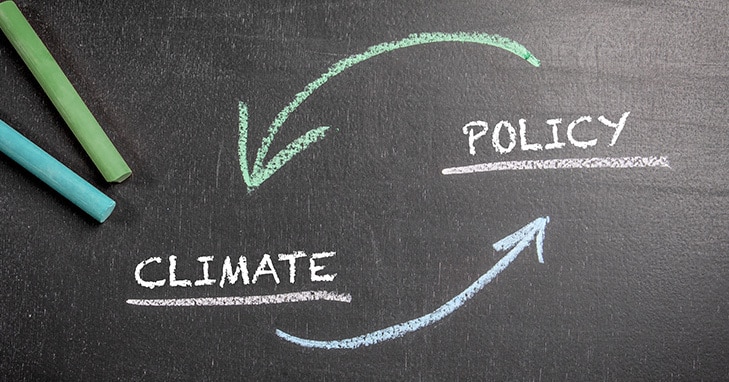Perhaps in no other forum is the friction between governments and corporations more on display as it is at Davos. The dominant themes throughout this year’s congregation were adapting to the new political environment and artificial intelligence (AI) with sustainability yielding its normally center-stage presence for a reduced focus. Each of these topics has many sides and perspectives with no objectively right answer.
The Trump Transition
Donald Trump assumed office for his second term as US president during Davos 2025 and acted on his promises of sweeping, policy-shifting executive orders. As expected, the US pulled out of the Paris Agreement (again) and declared an energy emergency that indicated a more unilateral energy strategy.
These climate-impacting policy shifts, along with actions to dissolve diversity, equity, and inclusion (DEI) initiatives, create diverging trajectories between US and Europe and an increasingly complex environment for businesses to navigate. Additionally, Trump’s tariff threats will reverberate up and down the supply chain as businesses will reevaluate their pricing and sourcing strategies.
British Finance Minister Rachel Reeves, who attended Davos, did not expect new tariffs to be a threat for the UK citing a balanced trade relationship with the US (a small surplus or deficit depending on the measures), and commented that UK tariffs would not address Trump’s trade goals of scaling back large deficits. Many EU countries, however, are on watch, as their trade relationships with the US are not all so even.

AI – The Hot Topic Everywhere
Davos attendees reported AI dominating conversations everywhere from start-ups rubbing elbows in the hopes of funding to political leaders expressing hesitation about AI arms races. UN Secretary-General António Guterres spoke to the promise of AI for use cases including education, healthcare, and agriculture but also warned of its “profound risk, especially if AI is left ungoverned.”
Concerns around spread of misinformation, deepfakes, market exploitation, and surveillance coincided with the Trump administration’s announcement of Stargate, a partnership with Oracle, OpenAI, and Softbank with investment up to $500 billion from the US government, and the emergence of China-based Deepseek that rattled tech stocks.
For most businesses, AI remains a balancing act. Artificial intelligence has tremendous potential to improve efficiencies, uncover and summarize insights from vast pools of data, and alert managers of risks to name just a few applications. However, the required energy and associated costs of AI plead pragmatism to apply it strategically versus unbridled.
Working Toward a Sustainable Future?
Sustainability has often been a marquee topic at Davos; consequently, attendees noted a stark attitude change at this year’s congregation. In unregulated environments, sustainability can be seen as a voluntary expense that may cause a business to fall behind competitors that are nimbler when it comes to sourcing and operating at lower costs.
Many American companies appear to be adopting this tone in the early days of the new administration with its transition to less ESG-related federal oversight. On the other hand, European peers are facing the rigorous CSRD regulation and carbon taxes (including CBAM on imports) that force them to account for sustainability or pay a premium for apathy or noncompliance.
Nature doesn’t run on quarterly financial statements, and the impacts of climate change seldom have direct one-to-one cause-and-effect relationships. Disparate actions across the globe, over time impact distant regions and peoples.
The UN adopted 17 Sustainable Development Goals (SDGs) in 2015 to support goals to end poverty, protect the planet, and ensure prosperity for all by 2030. As the years tick closer to 2030, the momentum appears to be shifting away from cooperation needed to realize these goals.
Final Thoughts
Did this year’s Davos reveal world leaders’ true ambitions and expose years of climate promises and declarations to be greenwashing while waiting for an AI industrial revolution? Let’s not be bleak. A one-week Alpine gathering of global influencers who did not make sustainability the number 1 topic does not stop the momentum for a sustainable future.
The insurance industry knows that climate risk is physical risk. Financial institutions and investors know consumers are more selective and informed than ever before, and their preferences for sustainable goods and services are growing and well documented. Businesses must continue to take sustainability seriously outside of the regulatory lens, because, like climate change, it will catch up to them sooner or later.
Find out how IsoMetrix can help you manage emerging risks and sustainability transparency using AI today

